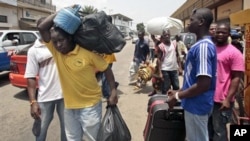Relief officials are calling on both sides to avoid civilian casualties in the fight for control of Abidjan as the political crisis in Ivory Coast has already displaced nearly one million people.
Aid agencies and rights organizations are warning of a deteriorating humanitarian situation as fighting between forces loyal to Ivory Coast's rival presidents battle in the streets of the commercial capital Abidjan.
The United Nations has said between 700,000 and one million have already fled the fighting, mostly from Abidjan, and hundreds have been killed in fighting since the country's contentious November presidential elections.
The U.N. Human Rights office said Friday it was alarmed by unconfirmed reports of looting, extortion, abduction and ill-treatment of civilians committed by fighters loyal to internationally recognized President Alassane Ouattara who are fighting to unseat incumbent President Laurent Gbagbo.
A spokesman for the U.N. High Commissioner for Human Rights, Rupert Colville, says most of the reports are coming from western Ivory Coast where fighters were advancing toward the capital.
“Initially, most of the abuses, if not all the abuses, were by the forces in support of Laurent Gbgabgo - former president - but recently there's been an increase of retaliatory attacks by people on the other side, including a slightly mysterious group called the Invisible Commandos who've been operating against Gbagbo," said Colville.
Colville warned that atrocities committed on either side will be investigated by the International Criminal Court and Human Rights Council.
“We were reminding people on both sides, but I would say particularly on the side of President Ouattara, because these are the forces that are moving into Abidjan, that the commission of inquiry will interview both sides, not just one side," he said. "So there will be consequences if people abuse civilians, no matter which side they're on.”
The International Committee of the Red Cross said civilians are trapped by the fighting and can't get access to food, water or medicine.
Speaking at a news conference, head of operations Peter Kraehenbuehl said: "We have experience from many contexts of the region in both Liberia and Sierra Leone and also from Ivory Coast in previous periods of how suddenly a situation can become very unpredictable and violent for civilians that are living in very densely populated areas and where suddenly two parties use heavy weaponry in the middle of these densely populated areas and civilians get caught up in this, they get cut off from supplies, from access to health care."
Kraehenbuehl added that a majority of the refugees are constantly on the move, which has made it difficult to organize relief. The Red Cross issued a plea for an additional $16 million to help trapped civilians and refugees pouring over the Liberian border. It says it has already distributed emergency supplies to 20,000 displaced people.
Amnesty International and Doctors Without Borders issued similar statements of concern and said civilians must be allowed access to medical care.
Doctors Without Borders has treated 450 patients since March, including several hundred in western Ivory Coast. At the only health center still operating in the north of Abidjan, 15 gunshot victims were treated Thursday.




